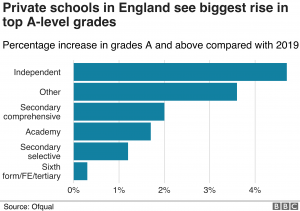The number of stories centred around A level results day meant students lacked the one thing we all needed in these uncertain times; clarity.
Five months ago, hundreds of thousands of students left college for, what they didn’t know, was the last time. Days later, exams were cancelled and that was it for many. A-levels were abruptly over.
“A-level students still had hope.”
From that moment in March, Coronavirus consumed our lives. Tuning into to BBC to watch the 5pm daily briefing was a regular occurrence; results day was too far away to even lend a second thought to.
However, ever since Scottish students received their grades last week, worry filled those in other parts of the UK who were receiving results on 13th August, due to statistics showing high pass rates for pupils from deprived backgrounds had been reduced by 15.2 percentage points. This clearly unfair way of calculating grades resulted in a U-turn from the Scottish Government, resulting in around 75,000 students grades eventually being upgraded.
A-level students still had hope.
If, in the worst case scenario, grades were calculated in a similar way, it seemed as though there would still be an opportunity to change the grades to make them much fairer. Ultimately, this was wishful thinking. Days before the dreaded results day, it was revealed that students could receive their mock grades, rather than the computer generated grades that we were promised would reflect our full potential. There was also news that England wouldn’t be following in Scotland’s footsteps of a U-turn and that the Education Secretary wouldn’t apologise.
To be honest, the number of stories centred around A-level results day meant students lacked the one thing we all needed in these uncertain times: clarity.
It remains really odd that the UK govt watched what happened in Scotland with exam results, knew the same thing would happen in England, but carried on anyway. Students, parents et al have been warning about precisely this happening for weeks.
— Krishnan Guru-Murthy (@krishgm) August 13, 2020
The exam process has always been somewhat troubling but ever since the introduction of ‘linear’ A levels in 2015 it has been proven to be increasingly detrimental to students’ mental health. In 2019, a national education union (NEU) poll found that 55% of respondents believed students’ mental health had worsened in comparison to previous cohorts before the reformation of A levels. This inevitable decline of mental health in students, combined with the current Covid-19 climate, has therefore, ultimately, created an extremely toxic environment for future generations of school leavers.
Yet, the effects of the pandemic on today’s generation of students goes far beyond the results they’ve received this week. The college classes of 2020 have, bluntly, been dragged through the mud. The first years to endure on the new 9-1 GCSE grading system, the first years to be provided with almost no practice papers. They are students filled with complete and utter uncertainty. In addition to this, the cancellation of exams provided another sense of doubt as no student could predict how they had done. One A-level student, Danielle Lane, commented, “I feel like the grades I’ve been given don’t reflect the work I put in […] it’s made me feel so stressed and disappointed.”
A second A-level student, Georgia Carroll, whose results were downgraded to the point where she missed out at her dream university, says “it’s frustrating that we’ll never know what grade we could have achieved.” This comment from Georgia comes after it was revealed that the option to re sit exams could incur huge fees and would ultimately be a huge struggle for the majority of students, given the amount of teaching time that has been lost because of the pandemic.
“Everyone knew the grading system wasn’t going to be perfect,”
Exams and the process of applying to university was never meant to be easy but the unknown algorithm used to provide academic grades has caused extreme struggles for students racing to appeal their grades in order to secure a university spot.
The day ended on the 13th August with students praying appeals would allow them in-to their firm choices; and woke up on the 14th finding out university spaces were full.
Everyone knew the grading system wasn’t going to be perfect, it was inevitable students up and down the country would be appealing these computer moderated grades, but the statistics show, like in Scotland, the way grades have been awarded are simply unfair. Ofqual’s deputy chief regulator even branded the system as having “some evidence of bias”.

So, yesterday’s government miscalculation has left many stress-filled students around the UK still sitting in limbo as they remain unaware of where they will be studying next month. The education secretary, Gavin Williamson, defends the algorithm despite many critcising the process as a ‘random letter generated system’. Instead, he sits tight. Waiting patiently for the second round of this fiasco next week. When GCSE results are published. Only time will tell if the government will come under the same scrutiny for this. It’s students’ futures that are at risk.
Yasmin Walker
Featured illustration courtesy of Gabriella Nero.


Very well explained and thought out with very valid points and opinions, what a talented young lady!!
WOW!!!
What an EXCELLENT article.
In the near future I believe that you will become the prime minister. I will definitely vote for you .